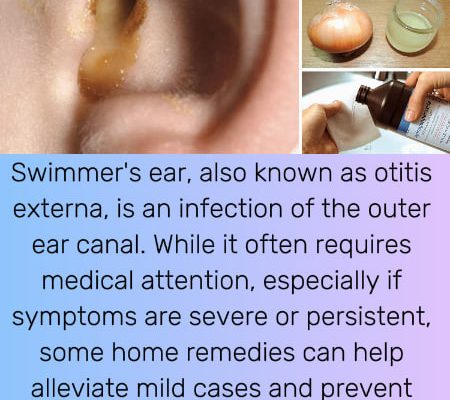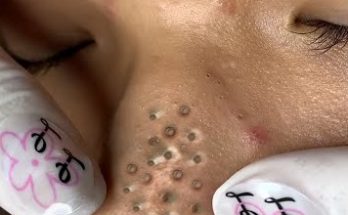Swimmer’s ear, also known as otitis externa, is an infection of the outer ear canal. While it often requires medical attention, especially if symptoms are severe or persistent, some home remedies can help alleviate mild cases and prevent recurrence.

Here are 6 home remedies that may help with swimmer’s ear:
- Vinegar and Rubbing Alcohol Drops: This is a popular and often recommended preventative measure. A mixture of equal parts white vinegar and rubbing alcohol can help dry out the ear canal and create an acidic environment that inhibits the growth of bacteria and fungi.
- How to use: After swimming or bathing, tilt your head to the side and drop about 1 teaspoon of the solution into each ear. Let it sit for a few seconds, then tilt your head to allow it to drain out.
- Important: Do not use this remedy if you have ear tubes, a perforated eardrum, or suspect any damage to your eardrum. Always consult a doctor if you’re unsure.
- Keep Your Ears Dry: This is crucial for both prevention and treatment. Moisture creates a breeding ground for bacteria.
- How to do it: After swimming or showering, gently dry your outer ear with a soft towel or cloth. You can also use a hairdryer on the lowest setting, held at least a foot away from your ear, to help evaporate any remaining moisture.
- Avoid: Do not use cotton swabs or other objects to clean inside your ear canal, as this can push debris further in, irritate the delicate skin, or even damage your eardrum.
- Warm Compress: Applying gentle heat to the affected ear can help relieve pain and reduce inflammation.
- How to use: Soak a clean cloth in warm (not hot) water, wring out the excess, and apply it to the affected ear for 10-15 minutes at a time.
- Over-the-Counter Pain Relievers: For pain and discomfort, over-the-counter pain relievers like ibuprofen (Advil, Motrin IB) or acetaminophen (Tylenol) can be helpful. Always follow the dosage instructions on the label.
- Avoid Irritants: During an infection, avoid anything that could further irritate the ear canal. This includes:
- Swimming in dirty or polluted water.
- Using cotton swabs or fingers to scratch or clean inside the ear.
- Getting shampoo, soap, or other chemical products in your ear. Consider using cotton balls coated with petroleum jelly to protect your ears during baths or showers.
- Rest and Hydration: As with any infection, getting plenty of rest and staying well-hydrated can help your body recover.
When to Seek Medical Attention:
While these home remedies can be helpful for mild cases or prevention, it’s important to seek medical attention if:
- Your symptoms worsen or don’t improve after a few days of home treatment.
- You experience severe pain, fever, or drainage from the ear.
- You suspect your eardrum might be perforated.
- You have underlying health conditions that might make you more susceptible to complications.
A doctor can properly diagnose swimmer’s ear and prescribe antibiotic or antifungal ear drops, which are often the most effective treatment for active infections.


